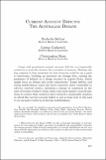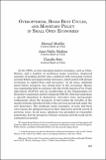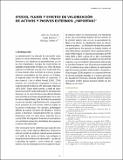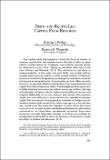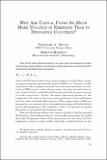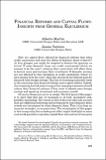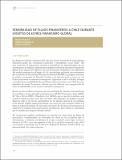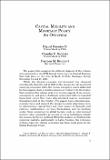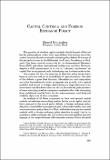Buscar
Mostrando ítems 1-10 de 21
Current account deficits: the Australian debate
Large and persistent current account deficits are frequently raised as a cause for concern for a number of reasons. Perhaps the key concern is that countries in this situation could be on a path to insolvency, building up excessive net foreign debt, raising the prospects of default or a sharp reversal ...
Overoptimism boom-bust cycles and monetary policy in small open economies
In the 1990s several emerging market economies such as Chile Mexico and a number of southeast Asian countries displayed episodes of peaking growth rates combined with increasing current account deficits and appreciating currencies which ended with abrupt reversions in capital flows and recessions. In ...
Stocks, flujos y efectos de valorización de activos y pasivos externos: ¿importan?
La reciente integración financiera internacional se ha caracterizado por el incremento en las posiciones de activos y pasivos externos y una creciente relevancia de los efectos de valorización (ganancias o pérdidas de capital). En este trabajo evaluamos empíricamente las implicancias de stocks, flujos ...
Debt- and equity-led capital flow episodes
Our earlier work has helped to switch the focus of studies of extreme capital flow movements toward the use of data on gross inflows (mainly driven by foreigners) and outflows (mainly driven by domestics) rather than relying on net flows (the sum of the two) (Forbes and Warnock 2012). The old focus ...
Why are capital flows so much more volatile in emerging than in developed countries?
One of the most studied subjects in open macroeconomics is what determines capital flows. In general, most papers are concerned with estimating the following regression. where the left-hand side is some measurement of capital flows, either as a percentage of gross domestic product (GDP) or as changes, ...
Capital mobility and monetary policy
The papers that comprise the different chapters of this volume were presented in the XVII Annual Conference on Central Banking that took place at the Central Bank of Chile, Santiago, during November 14 and 15, 2011. While the global economic environment has changed considerably from the end of 2011 ...
Financial reforms and capital flows: insights from general equilibrium
How are capital flows affected by financial reforms that relax credit constraints and raise the ability of domestic firms to borrow? At first glimpse one might be tempted to dismiss the question as trivial. If some domestic firms are credit constrained (which we assume to be the case!) relaxing their ...
Sensibilidad de flujos financieros a Chile durante eventos de estrés financiero global
Los flujos de capitales externos han sido una fuente constante de inestabilidad financiera para las economías pequeñas y emergentes como Chile. En este contexto, es importante conocer y cuantificar los determinantes de los movimientos de capital, especialmente durante eventos de disrupción financiera ...
Capital mobility and monetary policy: an overview
The papers that comprise the different chapters of this volume were presented in the XVII Annual Conference on Central Banking that took place at the Central Bank of Chile Santiago during November 14 and 15 2011. While the global economic environment has changed considerably from the end of 2011 to ...
Captial controls and foreign exchange policy
The question of whether capital controls should be part of the tool box for policymakers to deal with capital flows has become one of the central issues in the international economic policy debate. It was one of the key policy issues in the G20 under the French Presidency in 2011 and it has been covered ...

